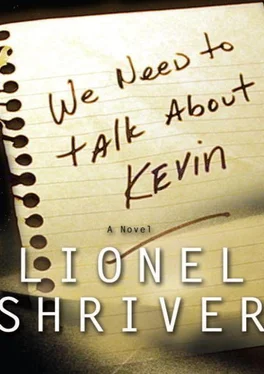Meanwhile, you were asking, “Seriously, Kev—do any of the students at your school ever seem unstable? Does anyone ever talk about guns, or play violent games or like violent movies? Do you think something like this could happen at your school? And are there at least counselors there, professionals kids can talk to if they’re unhappy?”
Broadly, you probably did want answers to these questions, but their caring-Dad intensity came across as self-serving. Kevin cased you before he replied. Kids have a well-tuned radar to detect the difference between an adult who’s interested and an adult who’s keen to seem interested. All those times I stooped to Kevin after kindergarten and asked him what he did that day—even as a five-year-old he could tell that I didn’t care.
“All the kids at my school are unstable, Dad,” he said. “They play nothing but violent computer games and watch nothing but violent movies. You only go to a counselor to get out of class, and everything you tell her is a crock. Anything else?”
“I’m sorry, Franklin,” I said, lifting Celia to sit beside me, “but I don’t see how a few more heart-to-hearts are going to put the brakes on what is clearly becoming some kind of fad. It’s spreading just like Teletubbies, only instead of having to have a rubber doll with a TV in its belly, every teenager has to shoot up his school. This year’s must-have accessories: a Star Wars cell phone and a Lion King semiautomatic. Oh, and some accompanying sob story about being picked on, or ditched by a pretty face.”
“Show a little empathy,” you said. “These are disturbed boys. They need help.”
“They’re also imitative boys. Think they didn’t hear about Moses Lake and West Palm Beach? About Bethel, Pearl, and Paducah? Kids pick up things on TV, they listen to their parents talking. Mark my words, every well-armed temper tantrum that goes down only increases the likelihood of more. This whole country’s lost, everybody copies everybody else, and everybody wants to be famous. In the long term, the only hope is that these shootings get so ordinary that they’re not news anymore. Ten kids get shot in some Des Moines primary school and it’s reported on page six. Eventually any fad gets to be uncool, and thank God at some point hip thirteen-year-olds just won’t want to be seen with a Mark-10 in second period. Until then, Kevin, I’d keep a sharp eye on any of your classmates who start feeling sorry for themselves in camouflage gear.”
As I reconstruct this tirade of mine, I can’t help but observe its implicit lesson: that if School Shootings would inevitably grow hackneyed, ambitious adolescents with a taste for the headlines had best make their bids while the going was good.
Just over a month later in Edinboro, Pennsylvania, fourteen-year-old Andrew Wurst promised one day to make his eighth-grade graduation dance “memorable,” and indeed, the next day he did. On the patio of Nick’s Place at 10 P.M., where 240 middle-schoolers were dancing to “My Heart Will Go On” from the film Titanic, Wurst shot a forty-eight-year-old teacher fatally in the head with his father’s .25-caliber handgun. Inside, he fired several more shots, wounding two boys and grazing a female teacher. Fleeing out the back, he was apprehended by the owner of Nick’s Place, who was carrying a shotgun and convinced the fugitive to back down in the face of superior firepower. As journalists were eager to observe for a welcome note of drollery, the theme of the dance was “I’ve Had the Time of My Life.”
Each of these incidents was distinguished by whatever sorry lessons could be squeezed from it. Wurst’s nickname was “Satan,” which resonated with the commotion over Luke Woodham in Pearl having been involved in a demonic cult. Wurst was a fan of an androgynous heavy-metal vocalist called Marilyn Manson, a man who jumped about on stage in poorly applied eyeliner, so this singer who was only trying to make an honest buck out of teenage bad taste was deplored in the media for a spell. Myself, I was sheepish about having been so derisive regarding the precautions taken at Kevin’s own eighth-grade dance the previous year. As for the shooter’s motivation, it sounded amorphous. “He hated his life,” said a friend. “He hated the world. He hated school. The only thing that would make him happy was when a girl he liked would talk to him”—exchanges that we’re forced to conclude were infrequent.
Maybe School Shootings were already growing passé, because the story of eighteen-year-old Jacob Davis in Fayetteville, Tennessee, in mid-May pretty much got lost in the shuffle. Davis had already won a college scholarship and had never been in trouble. A friend remarked to reporters later, “He didn’t hardly ever even talk. But I guess that’s the ones that will get you—the quiet ones.” Outside his high school three days before they were both to graduate, Davis approached another senior who was dating his ex-girlfriend and shot the boy thrice with a .22-caliber rifle. It seems the breakup had hit him hard.
I may have been impatient with lovesick teen melodrama, but as killers go Davis was a gentleman. He left a note behind in his car assuring his parents and his former girlfriend how much he loved them. Once the deed was done, he put down his gun, sat down next to it, and put his head in his hands. He stayed just like that until the police arrived, at which time the papers reported that he “surrendered without incident.” This time, anomalously, I was touched. I could see it: Davis knew he had done something stupid, and he had known it was stupid beforehand. For these two facts to be concurrently true would present him with the great human puzzler for the rest of his four-walled life.
Meanwhile, out in Springfield, Oregon, young Kipland Kinkel had digested the lesson that wasting a single classmate was no longer a sure route to immortality. Just three days after Jacob Davis broke his beloved parents’ hearts, this scrawny, weasel-faced fifteen-year-old upped the ante. Around 8 A.M. as his classmates at Thurston High finished up their breakfast, Kinkel walked calmly into the school cafeteria bearing a .22-caliber handgun, a 9-millimeter Glock, and a .22-caliber semiautomatic rifle under a trench coat. Deploying the most efficacious weapon first, he sprayed the room with rifle fire, shattering windows and sending students diving for cover. Nineteen in the cafeteria were shot but survived, while four additional students were injured in the panic to get out of the building. One student was killed outright, a second would die in the hospital, and a third would have died as well, had Kipland’s semiautomatic not run out of ammunition. Pressed to a boy’s temple, the rifle went click, click, click .
As Kinkel scrambled to insert a second clip, sixteen-year-old Jake Ryker—a member of the school wrestling team who’d been shot in the chest—lunged at the killer. Kinkel pulled a pistol from his trench coat. Ryker grabbed the gun and wrenched it away, taking another bullet in the hand. Ryker’s younger brother jumped on the shooter, then helped wrestle him to the ground. As other students piled on top, Kinkel shouted, “Shoot me, shoot me now!” Under the circumstances, I’m rather surprised they didn’t.
Oh, and by the way: Once in custody, Kinkel advised the police to check his home address—a lovely two-story house in an affluent subdivision lush with tall firs and rhododendrons—where they discovered a middle-aged man and woman shot dead. For at least a day or two there was much evasion in the press about who these two people might be exactly, until Kinkel’s grandmother identified the bodies. I’m a little disconcerted as to just who the police imagined might be living in Kinkel’s home besides his parents.
Читать дальше












